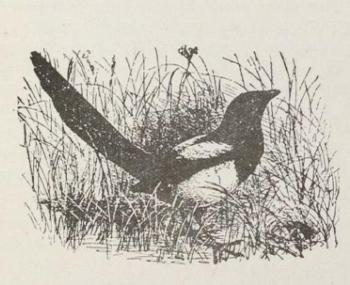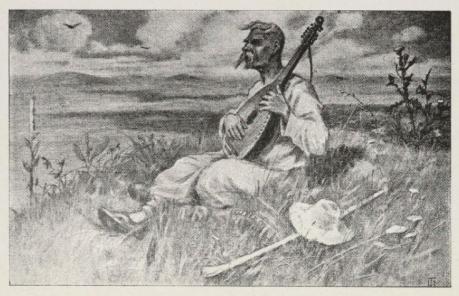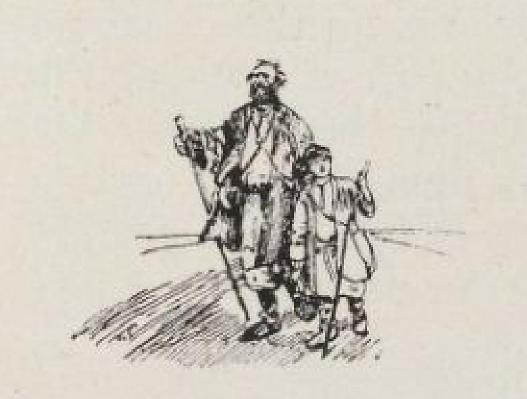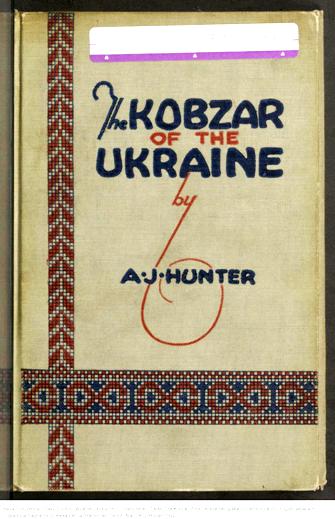| |
Тарас Шевченко
ТАРАСОВА НІЧ
На розпутті кобзар сидить
Та на кобзі грає,
Кругом хлопці та дівчата,
Як мак процвітає.
Грає кобзар, виспівує,
Вимовля словами,
Як москалі, орда, ляхи
Бились з козаками,
Як збиралась громадонька
В неділеньку вранці,
Як ховали козаченька
В зеленім байраці.
Грає кобзар, виспівує,
Аж лихо сміється...
«Була колись Гетьманщина,
Та вже не вернеться!..
Встає хмара з-за Лиману,
А другая з поля,
Зажурилась Україна —
Така її доля!
Зажурилась, заплакала,
Як мала дитина.
Ніхто її не рятує...
Козачество гине,
Гине слава, батьківщина,
Немає де дітись.
Виростають нехрещені
Козацькії діти,
Кохаються невінчані,
Без попа ховають,
Запродана жидам віра,
В церкву не пускають!
Як та галич поле криє,
Ляхи, уніяти
Налітають — нема кому
Порадоньки дати.
Обізвався Наливайко —
Не стало кравчини!
Обізвавсь козак Павлюга —
За нею полинув!
Обізвавсь Тарас Трясило
Гіркими сльозами:
«Бідна моя Україно,
Стоптана ляхами!
Україно, Україно!
Ненько моя, ненько!
Як згадаю тебе, краю,
Заплаче серденько...
Де поділось козачество,
Червоні жупани?
Де поділась доля-воля?
Бунчуки? Гетьмани?
Де поділося? Згоріло?
А чи затопило
Синє море твої гори,
Високі могили?..
Мовчать гори, грає море,
Могили сумують,
А над дітьми козацькими
Поляки панують.
Грай же, море, мовчіть, гори,
Гуляй, буйний, полем —
Плачте, діти козацькії,
Така ваша доля!»
Обізвавсь Тарас Трясило
Віру рятовати,
Обізвався, орел сизий,
Та й дав ляхам знати!
Обізвався пан Трясило:
«А годі журиться!
А ходім лиш, пани-брати,
З поляками биться!»
Вже не три дні, не три ночі
Б’ється пан Трясило.
Од Лимана до Трубайла
Трупом поле крилось.
Ізнемігся козаченько,
Тяжко зажурився,
А поганий Конецпольський
Дуже звеселився.
Зібрав шляхту всю докупи
Та й ну частовати.
Зібрав Тарас козаченьків
Поради прохати.
«Отамани товариші,
Брати мої, діти!
Дайте мені порадоньку,
Що будем робити?
Бенкетують вражі ляхи
Наше безголов’я».
«Нехай собі бенкетують,
Нехай на здоров’я!
Нехай, кляті, бенкетують,
Поки сонце зайде,
А ніч-мати дасть пораду —
Козак ляха знайде».
Лягло сонце за горою,
Зірки засіяли,
А козаки, як та хмара,
Ляхів обступали.
Як став місяць серед неба,
Ревнула гармата,
Прокинулись ляшки-панки —
Нікуди втікати!
Прокинулись ляшки-панки
Та й не повставали.
Зійшло сонце — ляшки-панки
Покотом лежали.
Червоною гадюкою
Несе Альта вісті,
Щоб летіли круки з поля
Ляшків-панків їсти.
Налетіли чорні круки
Вельможних будити,
Зібралося козачество
Богу помолитись.
Закрякали чорні круки,
Виймаючи очі.
Заспівали козаченьки
Пісню тії ночі,
Тії ночі кривавої,
Що славою стала
Тарасові, козачеству,
Ляхів що приспала.
Над річкою, в чистім полі,
Могила чорніє,
Де кров текла козацькая,
Трава зеленіє.
Сидить ворон на могилі
Та з голоду кряче...
Згада козак Гетьманщину,
Згада та й заплаче!
Було колись, панували,
Та більше не будем!..
Тії слави козацької
Повік не забудем!..»
Умовк кобзар, сумуючи:
Щось руки не грають.
Кругом хлопці та дівчата
Слізоньки втирають.
Пішов кобзар по улиці —
З журби як заграє!
Кругом хлопці навприсядки,
А він вимовляє:
«Нехай буде отакечки!
Сидіть, діти, у запічку,
А я з журби та до шинку,
А там найду свою жінку,
Найду жінку, почастую,
З вороженьків покепкую».
(1838, Санкт-Петербург)
|
|



